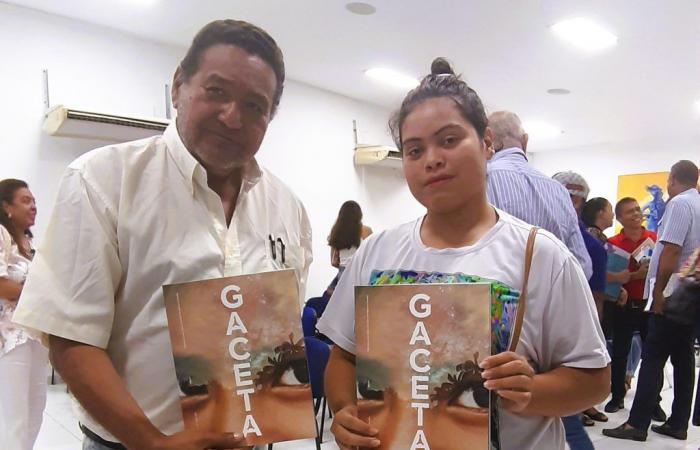In the Plaza Alfonso López, in Valledupar, there is a mango tree that grew old to the sound of the 36 vallenato festivals celebrated there. It is so emblematic that they have composed songs for it and serenaded it, and now that the Festival is held in another part of the city, it overshadows the Book Fair, the Felvawhich this year celebrated its second version, next to a stage with speakers that for four days amplified the songs of the recently deceased Ómar Geles.
The Gazette magazine He arrived there, to his first regional book fair, with the first issue of this third stage, a monograph on the jungle made for the hundred years of La vorágine. Under the mango tree and next to the speakers, she was greeted by about twenty exhibitors who from June 6 to 9 offered the walkers books of stories, novels of manners, poetry, journalism, academic studies on the Caribbean and, of course, , texts about vallenato.
That musical essence of Felva goes beyond the accordions that play in the background. It is in the books that are released there, read aloud and put up for sale, as happened this year with “Zuleta’s tricks”about the life of the singer Poncho Zuleta, the writer Julio Oñate, and “If the reveler knew about figures”, a study of 1,117 vallenato albums released between 1961 and 2019 carried out for a decade by engineer Fabián Dangond. And when music is missing, it is missed, as did that speaker who, when talking about the posthumous book by Gabriel García Márquez, “See you in August”he complained that in that novel “The great absentee is the vallenato.” It is an essence that the cultural journalist and caricaturist Edgardo Mendoza summarizes: “we (the vallenatos), more than readers, are listeners, because this is a region of orality.”
You may be interested in: Jorge Alí Triana: “Both directors and actors have more than seven lives.”
One of those reader-listeners is William de Ávila, a journalist and poet who, at the end of a discussion on cultural journalism to which Felva invited Gaceta, approached to tell us that he received his copy with special affection because in the past he was a reader. judicious of the magazine in the 80s.
He met her in a library. Maybe it was the one at the House of Culture, he says, but wherever it was, he remembers well that he became an assiduous reader of the collection that he found in the newspaper library. Of course, he had a cultural program on Radio Guatapurí and had previously been a book seller.
“They were very varied magazines”says. “I remember a lot the literature articles, which I have always liked; those of literary criticism, photographs. They were texts written by specialists, by people involved in art. There were illustrations made by Colombian artists; memory of Álvaro Barrios, of Alejandro Obregón; photographs by Leo Matiz, by Nereo López. There you also learned a lot about Colombian and foreign cinema.”
William de Ávila and the radio commentator Valeria Mora.
Gaceta lived its first stage between 1976 and 1984 and the second between 1989 and 2001. All the issues that William read were borrowed, but he wanted them to be his, so one day in 1990, at the age of 27, he wrote a letter to Colcultura (former Ministry of Culture) asking that magazines be sent to him. “That year I signed up for a reading promotion seminar/workshop taught by someone from Colcultura. I expected the magazines to arrive in the mail before the seminar began. The day came and nothing. But, to my surprise, when we started the event, one of those who was going to direct it asked: ‘Who knows William de Ávila Rodríguez?’ That was me! So I raised my hand and he said, ‘Look, I brought you a package of magazines that they sent for you.’ There were about ten, and five or six books from the Basic Library of Culture. “It was a big surprise!”
He has treasured them since then. These days he keeps them in boxes because he is “rebuilding” his library, but now that the Ministry of Culture, Arts and Knowledge gave life to Gaceta for the third time, he told us that he wants to return to reading those magazines.
William is an example of the old Gaceta reader who is preparing for a new stage, but in Valledupar we find, above all, new readers like Yamil Álvarez, a writer in his twenties who connected with the magazine when we told him what this first issue was about. “About the jungle? Of course I love her! “How I like nature!” He immediately sat down to look at it, and later we saw him riding a bicycle along a street in the historic center, with Gaceta under his arm.
Or the accordion player and content creator about vallenato on social networks Víctor José Navarro, who participated with us in the discussion on cultural journalism and took a magazine that he was grateful for, but not before giving another example of the musical essence of Felva and Valledupar and take out the accordion to sing as a warning that “If you don’t sing you forget it”:
oral traditions
Oral traditions have been like writing
music, literature
of original songs.
Its incomparable beauty
today committed
deserves to be protected for new generations
defending its creators
If it is not sung it is forgotten.
Postscript: We returned from Valledupar and now we are preparing the launch of the second issue of Gaceta, dedicated to television, regarding the 70 years of television in Colombia. It will be this Wednesday, June 19 at 6:00 in the afternoon in the Germán Arciniegas auditorium of the National Library, in a conversation called “A portable world: 21st century television”. Sandro Romero Rey, director and writer, will participate; Silvia María Hoyos, journalist and documentary filmmaker; Diana Díaz, director of Audiovisuals at Minculturas; and Santiago Rivas, cultural journalist. Admission is free and there will be magazines for all attendees.
You may be interested in: The challenge of consolidating social movements that last.






